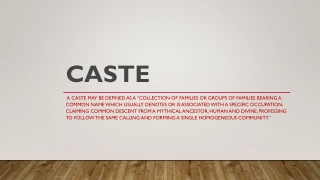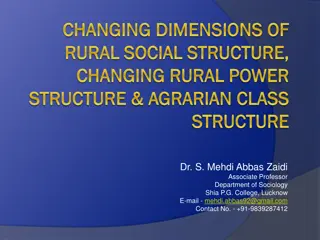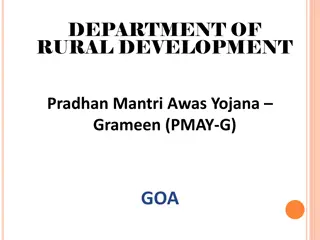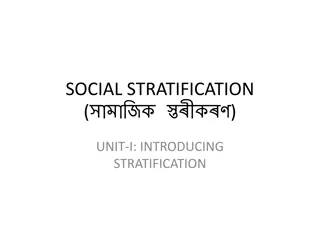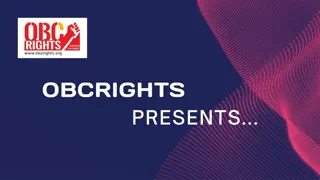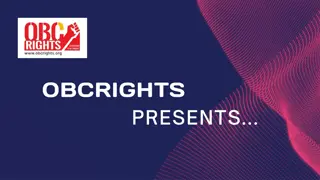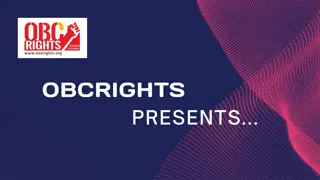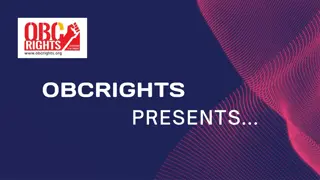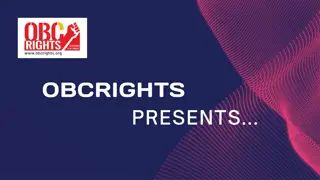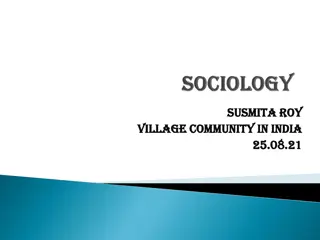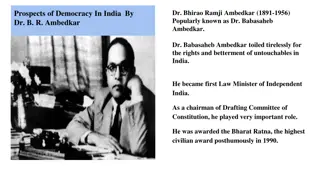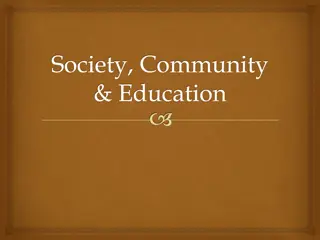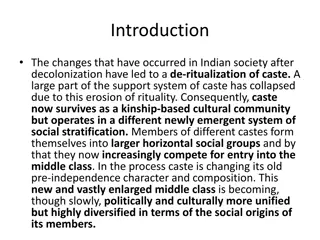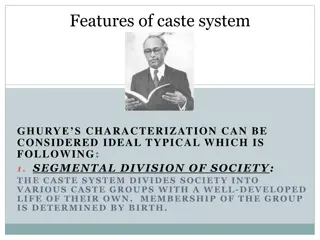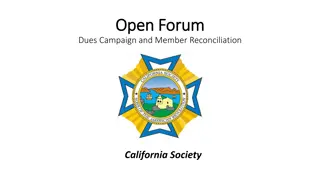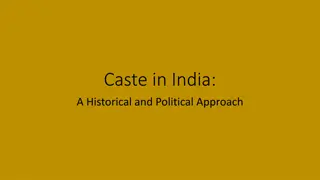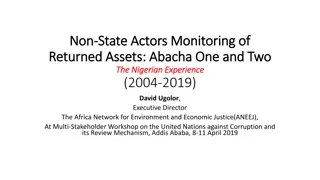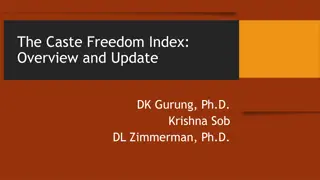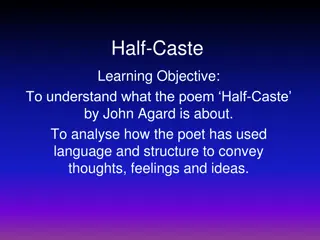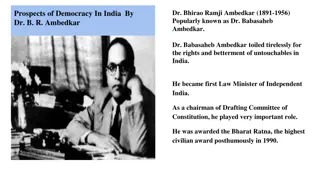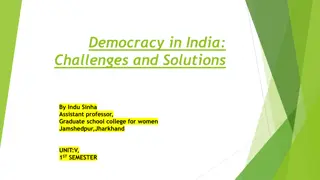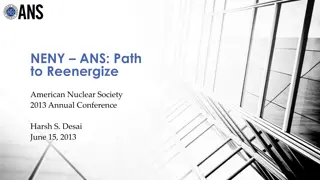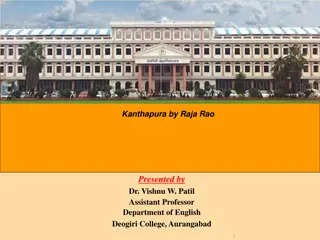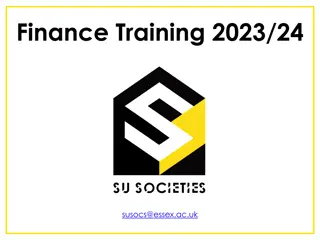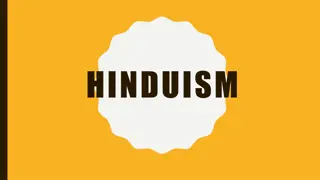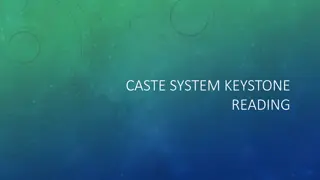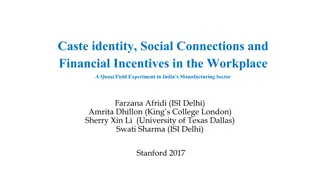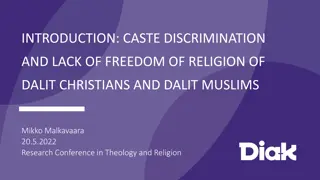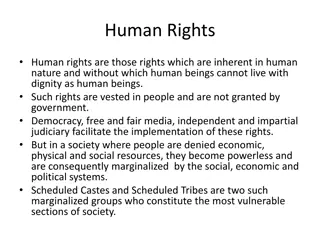Society 5.0 - Co-creating the Future
The concept of Society 5.0 for SDGs in this informative presentation by NAKAJIMA Koh, Deputy Director at Keidanren (Japan Business Federation). Discover how technological advancements and digital transformation are shaping the future of society, and the role of social partners in creating a data-dri
17 views • 37 slides
Pi Mu Epsilon Honor Society Induction Ceremony and History
The 49th Annual Induction Ceremony of the North Carolina Zeta chapter featured advisor Dr. Russell Herman. Established to promote mathematical scholarship, Pi Mu Epsilon Honor Society has fourteen NC chapters including Duke University and UNC Chapel Hill. The society's pledge emphasizes promoting tr
2 views • 11 slides
Overview of Caste System in India
The caste system in India is a social structure defined by hereditary groups, each with specific occupations, rules, and traditions. Membership is based on birth, leading to a rigid hierarchy and limited mobility between castes. Endogamy, occupation, commensality, and purity are key features that sh
0 views • 17 slides
Understanding Gender Roles in Society
Gender roles in society are socially constructed, with distinctions between gender and sex. Gender influences behavior, responsibilities, and societal expectations. Factors like family, caste, class, religion, culture, media, and laws play a significant role in shaping these roles. It's crucial to c
2 views • 34 slides
Status of Family Laws in India: Hindu vs. Religious Minorities
The family and personal status laws in India vary between Hindu law and those pertaining to religious minorities. While Hindu law has seen extensive reforms, discriminatory provisions still exist. In contrast, laws governing religious minorities have undergone fewer reforms, leading to greater inequ
2 views • 4 slides
Changing Dimensions of Rural Social Structure in India
Rural social institutions in India have deep historical roots, encompassing family, kinship, caste, class, and village structures. This complexity reflects a wide range of social norms, values, roles, and obligations. Changes in the caste system and the practice of jajmani are also highlighted, show
2 views • 21 slides
Pradhan Mantri Awas Yojana Grameen (PMAY-G) in Goa
Pradhan Mantri Awas Yojana Grameen (PMAY-G) is a housing scheme launched in Goa aiming to provide assistance to rural families for constructing houses. Beneficiaries are selected based on the Socio Economic Caste Census 2011. The scheme offers financial aid of Rs. 1,20,000 per house. Challenges face
0 views • 8 slides
Latin America Society of American Nuclear Society - Overview and Governance
The Latin American Section of the American Nuclear Society (LAS/ANS) was established in 1975 to represent nuclear professionals across Latin America. It focuses on promoting nuclear science and technology in various fields, facilitating research and education, organizing technical meetings, and fost
2 views • 43 slides
Iravati Karve - Renowned Anthropologist and Sociologist
Iravati Karve (1905-1970) was a distinguished anthropologist, sociologist, educationist, and writer known for her work on kinship, Indian culture, and the Mahabharata. Through her major works and analysis of kinship organization in India, Karve made significant contributions to understanding regiona
2 views • 14 slides
SOCIAL STRATIFICATION
Social stratification categorizes individuals based on factors like wealth, education, and power. Caste systems, as seen in India, are closed and ascribed by birth, while class systems are open and based on achievement. This comparison highlights the differences between the two systems and their imp
4 views • 5 slides
How to apply for a Community Certificate in Tamil Nadu
A community certificate is a document serving as proof that an individual belongs to a specific category or caste. The main reserved categories in the country are Scheduled Caste (SC), Scheduled Tribes (ST), and Other Backward Classes (OBC). This certificate can be applied in the E-Sevai portal.\nTo
3 views • 5 slides
DNC cast list popuplation in as per Ambasankar Commission .
Denotified Communities (DNC) refer to social and educationally Backward groups officially recognized and labelled as such by the Government under the Tamilnadu Backward community.DNC population Count as per the Ambasankar Commission report:Note: The Following are the Communities that are in the Cent
4 views • 5 slides
BC Caste population as per Ambasankar Commission in India
In India, the term \u201cBackward Classes\u201c(BC) refers to socially and educationally Backward groups. In India, they come to OBC at the National level.\nBC population Count as per Ambasankar Commission:\nNote: The Following are the Communities that are in the Central Government list of \u201cOBC
6 views • 5 slides
MBC Caste population as per Ambasankar Commission in India.
MBC in the Indian context typically refers to \u201cMost Backward Classes.\u201d This is a category used in some Indian states to identify communities that are considered socially and educationally Backward.\nMBC population Count as per Ambasankar Commission\nNote: The Following are the Communities
3 views • 5 slides
Guidelines for Upholding Rights of LGBTQ
In light of evolving societal norms and the imperative to safeguard the rights and dignity of LGBTQ individuals and inter-faith\/inter-caste couples, the Supreme Court has given guidelines for the handling of habeas corpus petitions and petitions for police protection.\nBackground:\nRecent instance
9 views • 4 slides
How to apply for a Community Certificate in Tamil Nadu
A community certificate is a document serving as proof that an individual belongs to a specific category or caste. The main reserved categories in the country are Scheduled Caste (SC), Scheduled Tribes (ST), and Other Backward Classes (OBC). This certificate can be applied in the E-Sevai portal.\nDo
6 views • 5 slides
how to get Inter caste Marriage Certificate in Tamil Nadu
other spouse is from a Non-Scheduled Caste. This type of marriage often requires special considerations and documentation due to the different social categories of the spouses.\\nDocuments Needed:-\\nTo request an Inter-caste Marriage Certificate in Tamil Nadu, you must provide the following documen
5 views • 5 slides
Understanding Civil Society: Concepts, Challenges, and Implications
Explore the dynamics of civil society, from its dense network of groups to its role in democracy. Delve into the typology of Civil Society Organizations, the connection between civil society and democracy, and the unique landscape of civil society in Norway. Engage in thought-provoking discussions o
0 views • 9 slides
Socio-Cultural Features of Village Community in India
The traditional village community in India was historically self-sufficient, with its own production and consumption units. Over time, changes have led to increased interactions among villages, diminishing self-sufficiency. Factors like multi-caste populations, markets, pilgrimages, and pilgrimages
3 views • 18 slides
Challenges of Caste System and Democracy in Indian Society
Dr. B.R. Ambedkar discusses the prospects of democracy in India, highlighting the challenges posed by the caste system. He emphasizes the need for true societal unity and cooperation to achieve democracy beyond a mere form of government. The Caste system's deep-rooted inequality and lack of shared e
0 views • 10 slides
Understanding the Elements of Society: Society, Community & Education
Society is a complex web of social relationships characterized by likeness, inter-dependence, and cooperation among individuals. It is not just a group of people but a system of organized associations and communication within a community. With elements like similarity, diversity, inter-dependence, a
0 views • 23 slides
Evolution of Caste in Post-Colonial Indian Society
Changes in Indian society post decolonization have led to the de-ritualization of caste, resulting in a shift towards a kinship-based cultural community operating in a new system of social stratification. Secularization of caste has detached it from ritual hierarchy and aligned it with competitive d
5 views • 10 slides
Features of Caste System: Ghurye's Characterization
The caste system, as characterized by Ghurye, features segmental division of society determined by birth, hierarchy based on purity, restrictions on feeding and social intercourse, civil and religious privileges/disabilities, lack of occupational choice, and severe restrictions on inter-caste marria
2 views • 6 slides
Enhancing Civil Society Engagement in the Global Financing Facility (GFF)
Explore key tools and strategies for enhancing civil society engagement in the GFF, including the Civil Society Engagement Strategy, guidance notes, CSO resources, and the value of civil society in RMNCAH+N. Learn how civil society can contribute to advocacy, monitoring, accountability, and more tow
0 views • 16 slides
California Society Membership and Dues Reconciliation Processes
Dive into the membership and dues reconciliation procedures of the California Society, highlighting key dates, life membership programs, and documentation requirements. Learn about old and new life member programs, important deadlines, and the significance of each step in the reconciliation process
0 views • 24 slides
Understanding Caste in India: A Historical and Political Perspective
Caste in India is a complex system deeply intertwined with religion, history, and society. It is a hierarchical structure that dictates social organization, power dynamics, and economic relationships. The system, comprising varna and jatis, perpetuates inequality and marginalization, with long-stand
0 views • 22 slides
Monitoring and Recovery of Abacha Loot in Nigeria: The Civil Society's Advocacy Efforts
Civil society in Nigeria, led by organizations like ANEEJ, has been actively involved in monitoring and advocating for the recovery and transparent disbursement of assets stolen by the Abacha regime. Through initiatives like MANTRA, they have ensured that returned funds are used for the benefit of t
0 views • 10 slides
Understanding the Caste Freedom Index in Nepal
Delve into the Caste Freedom Index in Nepal, highlighting the current status of Dalits and the need for such an index. Learn about the caste system's power and organization in Nepalese society, and why this index is crucial in combating caste-based discrimination. Explore historical perspectives and
0 views • 20 slides
Understanding John Agard's Poem "Half-Caste
Explore the meaning and themes of John Agard's poem "Half-Caste," analyzing how the poet uses language and structure to convey thoughts and feelings. Delve into the origins of the term "half-caste" and its implications, as well as Agard's unique approach to humor and breaking down racial boundaries
0 views • 13 slides
Challenges of Caste System in Indian Democracy
Dr. B.R. Ambedkar highlighted the challenges of democracy in India, emphasizing the deep-rooted caste system. He explained how the caste system leads to inequality, lack of community purpose, and hinders the ideals of a democratic society. The differences between caste and class systems were also ou
0 views • 10 slides
Challenges Faced by Indian Democracy: Solutions and Way Forward
Democracy in India faces various challenges including casteism, communalism, regionalism, poverty, terrorism, corruption, illiteracy, and more. These challenges must be addressed for the effective functioning of democracy. The society's division based on caste, religious tensions, and socio-economic
0 views • 18 slides
Revitalizing American Nuclear Society: Strategies for Success
The content discusses the revitalization efforts of the American Nuclear Society, focusing on key areas such as organizational and leadership changes, refocused vision and strategy, accountability, and culture change. It outlines the challenges faced by the society in June 2011 and presents a roadma
0 views • 18 slides
Raja Rao's Kanthapura: A Tale of Tradition and Transformation
Raja Rao's novel "Kanthapura" narrates the story of a village in South India through the eyes of an old woman, Achakka. The village is divided by caste, with Brahmins holding privilege. The protagonist, Moorthy, embraces Gandhian ideals and challenges the caste system, facing excommunication. The no
0 views • 19 slides
Understanding Society Finances: Roles, Accounts, and Reports
Roles and responsibilities of society finance leaders, managing society accounts, understanding weekly finance reports, and handling membership funds and other income sources. Emphasis on the importance of using only the official society account and receiving and reviewing weekly finance reports.
0 views • 36 slides
Insights into Hinduism: Traditions, Beliefs, and Society
Hinduism, an ancient religion, developed by the Aryans in India, encompasses a diverse pantheon of gods, beliefs in reincarnation and karma, and a structured caste system. The worship of numerous gods reflects the monotheistic belief in Brahma. Social aspects, such as the caste system, play a signif
0 views • 17 slides
Understanding the Caste System through a Dalit Perspective
Explore the author's purpose in discussing the life of Dalits, the transformation they have undergone, and the challenges they still face within the traditional caste system. Discover insights into the portrayal of Dalits in society, the role of statistics in highlighting their realities, and the on
0 views • 8 slides
Caste Identity and Social Connections in Indian Manufacturing Sector
The study explores the impact of caste identity and social networks on productivity in Indian garment factories. It highlights the persistence of social and economic inequality based on caste, affecting poverty rates and income differentials. The research delves into how caste-based recruitment and
0 views • 31 slides
Caste Discrimination and Lack of Religious Freedom Among Dalit Christians and Dalit Muslims
This research conference delves into the issues of caste discrimination and limited freedom of religion faced by Dalit Christians and Dalit Muslims in India. It explores the historical and social context, theological influences, and the significance of counter theology in addressing these systemic i
0 views • 20 slides
Challenges in Protecting Rights of Marginalized Groups in India
Despite constitutional provisions and legal frameworks, marginalized groups such as Scheduled Castes and Scheduled Tribes in India continue to face exploitation, discrimination, and violations of their rights. Protective discrimination measures have been found insufficient in addressing the deep-roo
0 views • 15 slides
University of Toronto Graduate Nurses Student Society Overview
The Graduate Nurses Student Society (GNSS) at the University of Toronto represents and advocates for graduate nursing students. It provides leadership, social involvement, mentorship activities, and promotes student-faculty engagement. The society's current executive team and council structure are o
0 views • 12 slides


